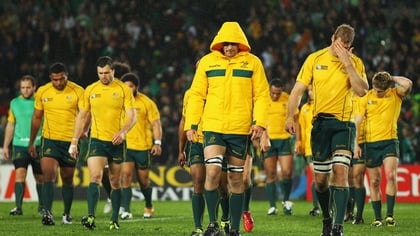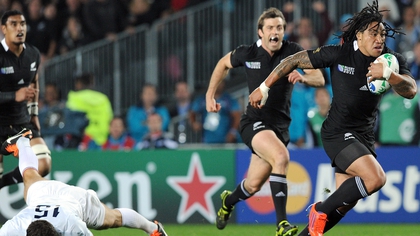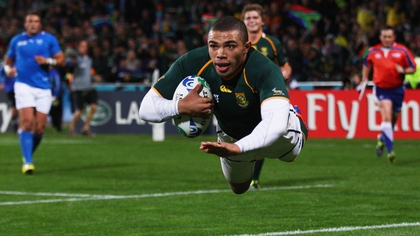by Warren Gatchell
Namibia was known as South West Africa prior to independence from South Africa in 1990 and Africa’s second rugby team has strong rugby links to its nearest neighbour, participating in the Currie Cup right up to 1989.
With previous match-ups being pretty one-sided affairs in these nation-versus-province contests, averaging 96-6, the match was always going to be an extended training run with the aim of giving the fringe players in the Bok squad much needed game time in advance of the playoffs.
Bryan Habana scored his 39th try for the Boks, surpassing the all time record set by Joost van der Westhuizen. The fact that it took the 2007 IRB Player of the year over 15 months to score a try is the big story here and I find it difficult to see Habana selected again after this world cup.
Keeping the Namibians scoreless was a team effort and by avoiding any injuries the match could be seen as a success. The 87 – 0 score line might make you think South Africa are on the right track but with Wales 81 – 7 demolition of Namibia a painfully short four days later I would be cautious in proclaiming any champions in the making just yet.
Australia under pressure

Australia had a few demons to exorcise after their defeat to Ireland and were as expected structured in attack and clinical towards the end of the match against the USA.
The frustration and pressure that the Wallaby team is under was however apparent early on in the game. Quade Cooper made a few selfish mistakes and lacked the composure which against stronger opposition would have been far more costly.
The Eagles brought their physicality and hounded Cooper on his own goal line to effect a turn over.
The resulting try scored from the scrum would be their only points in the match and again showed why Ireland’s tactics to take the Wallabies on up front was the only way to open up a very well drilled defensive system.
The final score of 67-5 is impressive at first glance and when you consider the amount of Wallaby errors the winning margin could have been far greater.
The biggest loser would have to be Australia’s Wycliff Palu who has had his tournament cut short due to a hamstring injury. David Pocock makes a welcome return for the final pool stage and poses a serious threat to South Africa should the play off spots unfold as expected.
The opening 6 minutes of New Zealand v France were captivating in that Les Bleus showed how maintaining possession and keeping your errors to a minimum will place even the greatest teams under pressure. Pity about the next 74 minutes as France were unable to translate their initial dominance of territory and possession into points.
New Zealand showed why they are favourites

A powerful defensive scrum by the All Blacks earned a penalty to get out of jail and a few passes later, France were behind their posts awaiting the conversion.
We had to wait three weeks to see why the hosts are favourites to win the tournament. All Black rugby at its clinical best can be such a beauty to watch.
The backs and forwards interchange with such ease and fluidity, their control of the game regardless of field position is something other teams can’t compete with at this stage.
France fell away quite quickly and while the 32 – 17 score line might deceive you into thinking the match was a contest, it really wasn’t.
Boks – the only real opposition?

After Ireland cut up the script in the Australia game supporters are understandably optimistic about the team’s prospects on making it to the final. Have a read of a few extracts from the New Zealand Herald on where the threat to an All Black victory can come from:
“Thank goodness for the Springboks, because without their promising form we would be forced into declaring that the All Blacks will win the Webb Ellis in a canter.
“This sort of outrageous arrogance is not allowed in hosts with the most in terms of famous World Cup failures.
“The Australians are dog tucker on this side of the Tasman and are dallying with disarray. The Northern Hemisphere teams are subtlety-free.
“No one else has Daniel Carter and Ma’a Nonu. Springbok muscle and their history of rising to the occasion loom as the only serious threat.”
You can read Chris Rattue’s full article here.
Now I like you do find it a little presumptuous at this early juncture to be calling a POSSIBLE semi-final a “final” so I thought the joke below which I heard on a rival broadcaster’s intro to the NZ v FRA game sums up things nicely…
Question: “What do you call an All Black with a rugby world cup winner’s medal?”
Answer: “Granddad.”
As round three drew to a close the tightly fought battles of the opening weekend are no more. Each respective rugby powerhouse racked up a silly amount of points against the opposing minnows with the matches being a foregone conclusion long before the end of the 80 minute mark.
22 Sep 2011 South Africa 87 – 0 Namibia
23 Sep 2011 Australia 67 – 5 USA
24 Sep 2011 England 67 – 3 Romania
25 Sep 2011 Ireland 62 – 12 Russia
26 Sep 2011 Wales 81 – 7 Namibia
Have a quick look at the score lines above, do you think the matches would have been more of a contest had the “smaller” rugby nations been given the same amount of time to recover between matches as their tier1 counterparts, rather than the paltry 4 to 5 days?
How will rugby ever become a truly global game if the IRB handicaps the up-and-coming nations?